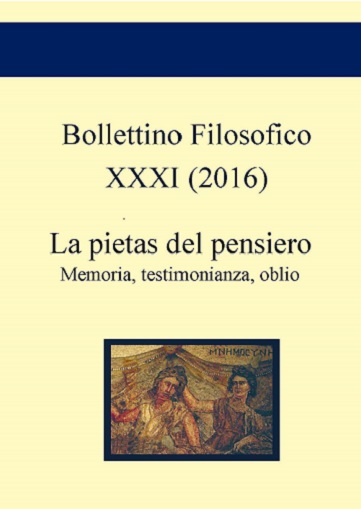Sui molteplici usi della pietà
Abstract
In general, pity has always been conceived as a passion or as a virtue. These are two ways of looking at the concept, which are difficult to conciliate. Heidegger, in particular, considers pity as something which comes into play when the philosopher is asking questions about the beings and about the manifestation of the being. At the same time, he also considers pity as a form of passion. In this case, phenomenology abandons the primacy of intentionality and becomes an exaltation of the pathe. On the other hand, according to a different perspective, pity as a virtue embraces a wide range of experiences, from that of tragedy to solidarity. The latter two make it possible to have an ethics of existence. Pity works a priori, it precedes any question, it prefers justice over knowledge and it is a way of looking at things which needs no plea, no question to understand the necessity of existence.Downloads
Bollettino Filosofico pubblica in internet, ad accesso aperto, con licenza:
|
|
CCPL Creative Commons Attribution |
L'autore conserva il copyright sul suo contributo, consentendo tuttavia a chiunque "di riprodurre, distribuire, comunicare al pubblico, esporre in pubblico, rappresentare, eseguire e recitare l'opera", purché siano correttamente citati l'autore e il titolo della rivista. L’autore, al momento della proposta di pubblicazione, è inoltre tenuto a dichiarare che il contenuto e l’organizzazione dell’opera è originale e non compromette in alcun modo i diritti di terzi, né gli obblighi connessi alla salvaguardia di diritti morali ed economici di altri autori o di altri aventi diritto, sia per testi, immagini, foto, tabelle, sia per altre parti di cui il contributo può essere composto. L’autore dichiara altresì di essere a conoscenza delle sanzioni previste dal codice penale e dalle leggi speciali per l’ipotesi di falsità in atti ed uso di atti falsi, e che pertanto Bollettino Filosofico è esente da qualsiasi responsabilità di qualsivoglia natura, civile, amministrativa o penale, e sarà dall'autore tenuta indenne da qualsiasi richiesta o rivendicazione da parte di terzi.
